Herbology
10 Essential Resources for Herbology Home Study
Yearn to master the ancient art of herbology from home? Discover the 10 essential resources to launch your journey to botanical bliss.

We're taking the first step towards becoming proficient in herbology by gathering the essential resources we need to study and practice herbology from the comfort of our own homes. We'll start with a well-stocked herbology starter kit, complete with cooking utensils and essential oils. Next, we'll explore online learning resources, such as interactive platforms and plant profiles. We'll also gather a library of herbalism books, plant identification guides, and herbal remedies recipes. Additionally, we'll connect with online herbal communities, participate in virtual workshops, and cultivate our own herbs with gardening essentials. As we continue, we'll dive deeper into research and education, self-study programs, and practical experience.
Key Takeaways
• Create a well-equipped herbology workspace with a starter kit featuring essential tools like cooking pots, measuring cups, and stainless steel utensils.
• Utilize online learning resources, including interactive platforms, plant profiles, and herbal preparation guides, to learn at your own pace.
• Supplement online learning with herbalism books, such as 'Herbal Medicine for Beginners' and 'Herbs for Common Ailments', for valuable knowledge and guidance.
• Leverage plant identification guides, like field guides and online tools, to accurately identify herbs and ensure safe use.
• Engage with online herbal communities, virtual workshops, and webinars to connect with like-minded individuals and experienced herbalists.
Herbology Starter Kit Essentials
We begin building our herbology starter kit with the essential tools that form the foundation of our herbal journey: a cooking pot, double boiler, measuring cups, funnels, and mixing utensils. These basics are vital for creating herbal preparations and engaging in herbal crafting. By investing in these essentials, we set ourselves up for success in our herbology home study.
Beyond the basics, we can enhance our herbology starter kit with additional tools like mixing bowls, spatulas, containers, and cheesecloth. Using stainless steel and glass tools dedicated for herbology guarantees safety and proper preparation of herbal formulations. We can also consider up-cycling containers for storing finished herbal products to reduce waste and promote sustainability.
Moreover, having sampler sizes of organic essential oils like eucalyptus, lavender, peppermint, sweet orange, and tea tree can enhance our DIY herbal formulations. With these herbology starter kit essentials, we'll be well-equipped to explore the world of herbalism and create effective herbal preparations. By prioritizing quality and safety, we'll tap into the full potential of our herbology home study.
Online Courses for Herbal Learning

As we explore online courses for herbal learning, we're excited to discover the wealth of knowledge available to us.
We can choose from courses that cover herbalism fundamentals, providing a solid foundation for beginners, or advanced studies that take our learning to the next level.
With options like Herbalism Fundamentals Online and Advanced Herbal Studies, we're spoiled for choice when it comes to expanding our understanding of herbology.
Herbalism Fundamentals Online
How do online herbalism courses provide a thorough understanding of herbology fundamentals, and what benefits do they offer to beginners in herbalism?
We've found that these courses cover essential topics like plant identification, medicinal uses, and herbal preparations, giving us a solid foundation in herbalism. Through interactive online platforms, we can engage in hands-on activities and assignments that help us develop practical skills in herbology. As beginners, we appreciate that these courses cater specifically to our needs, helping us deepen our knowledge of herbalism.
One of the key benefits is that we can learn about herbal medicine making, where we discover how to create our own herbal remedies. We also explore herbal monographs, which provide in-depth information about specific herbs, their properties, and uses. Additionally, we investigate herbal basics, such as understanding the different types of herbal preparations and their applications.
Advanced Herbal Studies
Building on our foundational knowledge of herbology, we're now ready to explore the advanced aspects of herbalism through online courses that offer thorough training and practical skills.
Advanced herbal studies provide an extensive understanding of herbal medicine, allowing us to delve deeper into the world of plant-based remedies. These online courses cover a range of advanced topics, including herbal materia medica, formulation, and medicine making.
We'll gain access to a wealth of resources, including plant profiles and herbal preparations, which will help us deepen our understanding of plant energetics and holistic health practices. By pursuing advanced herbal studies, we'll be able to develop our skills in creating herbal remedies and understanding the intricacies of herbal medicine.
With online courses, we can learn at our own pace, anytime, and from anywhere. Whether we're aspiring herbalists or simply enthusiasts, advanced herbal studies offer a wealth of knowledge and practical skills to enhance our understanding of herbology.
Herbalism Books for Home Study

When delving into the world of herbalism, we rely on thorough guides that provide a solid foundation for our home study, and three essential books stand out as must-haves for beginners.
As we explore the domain of herbalism, we need reliable resources that offer valuable knowledge and guidance. For us, Herbal Medicine for Beginners by Katja Swift and Ryn Midura is a top pick, providing a detailed introduction to the world of herbalism.
Another must-have is Herbs for Common Ailments by Rosemary Gladstar, which offers easy-to-follow recipes for herbal formulations.
Additionally, Medicinal Herbs: A Beginner's Guide by Rosemary Gladstar is an invaluable resource, offering insights into common herbs and their uses.
These books are essential for learning about herbalism at home, providing a solid foundation for our studies. They offer valuable knowledge and guidance as we explore the world of herbs and their medicinal properties.
With these resources, we can confidently begin our herbalism journey, equipped with the knowledge and skills necessary to harness the power of herbal medicine.
Plant Identification Guide Resources

As we explore the world of herbology, we recognize the importance of accurately identifying plants. That's why we're going to discuss the essential resources for plant identification, including field guides and online tools.
Field Guide Essentials
We depend on field guides to accurately identify plants, leveraging their detailed descriptions, illustrations, and photos to distinguish between similar species. As herbology students, we grasp the importance of precise plant identification, especially when it comes to creating herbal medicines. A single misidentification can have significant consequences, making field guides an indispensable resource for our studies.
When selecting a field guide, it's vital to choose one specific to our region. This guarantees that the plants listed are relevant to our area, increasing the accuracy of our identification. By consulting these guides, we can enrich our knowledge of plant characteristics, medicinal properties, and potential interactions. This detailed understanding is crucial in creating effective herbal remedies.
Field guides are particularly useful when working with medicinal plants that have lookalike species. For instance, a guide might highlight the subtle differences between a harmless plant and its toxic doppelganger. By consulting a trusted field guide, we can confidently identify plants and create herbal medicines that are both safe and effective.
Online Identification Tools
In addition to field guides, online identification tools have revolutionized the way we identify herbs, offering a convenient and efficient means to pinpoint species with precision. These online tools have become an essential part of our herbal knowledge, enabling us to expand our understanding of plant identification.
With mobile apps like PlantSnap, iNaturalist, and Seek by iNaturalist, we can quickly snap a photo of an unknown herb and let image recognition technology match it with their vast database. This not only saves time but also increases the accuracy of our identification.
Additionally, online resources like Botanical.com and the USDA PLANTS Database provide us with in-depth information on herbs, facilitating our research and study. We can also tap into online forums and communities, such as Reddit's r/whatsthisplant, to get assistance in identifying unknown herbs.
Herbal Remedies and Recipes

We'll explore the world of herbal remedies and recipes, where we can uncover our own marshmallow root tea and red onion syrup, and even experiment with dandelion coffee and savory oatmeal infused with fresh herbs.
As we investigate the world of herbal remedies, we'll learn to make our own herbal remedies at home. We'll discover the benefits of elderberry and echinacea in our herbal remedies, and learn how to store herbs properly to maintain their potency for effective herbal preparations.
By following recipes for herbal remedies, we can create their own herbal medicines and experiment with new flavors and ingredients. We'll even learn how to cultivate a herbalist garden with medicinal plants, so we can have fresh ingredients for our remedies.
With these skills, we'll be able to craft our own herbal remedies and recipes, tailored to our specific needs and tastes. By mastering herbal remedies and recipes, we'll reveal the full potential of herbalism and take our health and wellness to the next level.
Online Communities for Herbalists

As we venture into the world of herbalism, connecting with like-minded individuals through online communities becomes an essential step in our journey. These herbal communities provide a platform for online networking, where we can share knowledge, experiences, and resources with fellow herbal enthusiasts.
By participating in online forums and discussion groups, we can ask questions, seek advice, and engage in ongoing learning.
Here are some benefits of joining online herbal communities:
- Connect with like-minded individuals who share our passion for herbalism
- Stay updated on the latest trends, news, and events in the world of herbalism
- Participate in discussions and share our experiences with fellow herbalists
- Seek advice and guidance from experienced herbalists
- Expand our knowledge and skills through online herbal education and resources
Virtual Workshops and Webinars

We can further enhance our herbal knowledge and skills by exploring virtual workshops and webinars, which offer a convenient and interactive way to learn from experienced herbalists from the comfort of our own homes. These online platforms provide accessible and convenient opportunities to deepen our understanding and skills in herbology.
| Topic | Benefits | Features |
|---|---|---|
| Plant Identification | Gain confidence in identifying herbs | Live Q&A with expert herbalists |
| Herbal Preparations | Learn various methods for creating herbal remedies | Interactive demonstrations and recipes |
| Therapeutic Uses | Understand the medicinal properties of herbs | Case studies and real-life examples |
| Business Skills | Develop entrepreneurial skills for herbalists | Marketing strategies and business planning |
Through virtual workshops and webinars, we can engage with experienced herbalists, ask questions, and interact with a community of like-minded individuals. These interactive learning experiences cover various aspects of herbology, including plant identification, herbal preparations, and therapeutic uses. By participating in these online sessions, we can gain valuable knowledge and skills to enhance our herbal practices.
Gardening Supplies for Herbology

As we explore the world of herbology, we understand that having the right gardening supplies is essential for our journey. From pots and soil to seeds and gloves, we'll take a closer look at the essential tools we need to get started.
Let's examine the herb gardening essentials, seed starting success, and soil and compost needs that will help our herbs thrive.
Herb Gardening Essentials
We'll need some essential gardening supplies to get our herbology journey started, including pots, soil, seeds, watering cans, and gardening tools. As we set up our herb garden, let's not forget to select a sunny location to guarantee our herbs receive the right amount of sunlight.
Here are some must-haves for a thriving herb garden:
- Organic soil that's rich in nutrients and free of harsh chemicals
- High-quality seeds that are specifically bred for herbology
- Watering cans with fine nozzles to prevent washing away tiny seeds
- Gardening tools like pruners, cultivators, and trowels for maintenance
- A well-draining potting mix to prevent waterlogged soil
Seed Starting Success
With our herb gardening essentials in place, let's explore the world of seed starting, where the right supplies can make all the difference in germination and growth.
We've found that using seed starting kits or trays with clear lids is crucial for ideal germination and growth. These kits provide the perfect environment for our seeds to sprout and develop.
Next, we invest in high-quality organic potting soil to guarantee healthy seedling development. This soil is specifically designed to promote strong root growth and robust plant development.
To further enhance germination rates, we consider using heat mats to maintain a consistent soil temperature. This is especially important for herbs that require warmer temperatures to germinate.
Finally, we ensure proper lighting with grow lights or a sunny location to promote strong and healthy seedlings. And, to keep track of our different herb varieties as they grow, we use plant markers or labels.
Soil and Compost Needs
We're now focusing on the foundation of our herb garden: soil and compost, which provide the necessary nutrients for our herbs to thrive.
As we explore the world of herbology, we grasp the importance of creating a holistic health approach through Materia Medica and herbal recipes. However, we can't overlook the vital role soil and compost play in our herb garden's success.
Here are some essential considerations for our soil and compost needs:
- Choose nutrient-rich soil with good drainage for growing herbs at home.
- Compost can enhance soil fertility and provide essential nutrients for herb growth.
- Consider using organic compost to avoid harmful chemicals in your herb garden.
- Vermicompost, made from worm castings, is a popular choice for organic gardening.
- Proper soil and compost management are essential for healthy herb growth and sustainability.
Herbalism Research and Journals

As we explore the world of herbalism, keeping up-to-date with the latest research is vital, and that's where reputable journals like the Journal of Herbal Medicine and Phytomedicine come into play. These journals provide valuable insights into herbalism through peer-reviewed studies on the efficacy and safety of herbal remedies. Scholars and practitioners in herbology contribute to these journals, advancing knowledge in the field. By accessing and reading these research journals, we can deepen our understanding of herbal medicine.
Staying updated on the latest findings and developments in herbology is essential, and reputable research journals make it possible. We can tap into the collective knowledge of experts in the field, gaining a deeper understanding of the science behind herbalism. These journals are essential resources for anyone serious about advancing their knowledge in herbology.
Self-Study Herbalism Programs

Many of us turn to self-study herbalism programs because they offer the flexibility to learn at our own pace, allowing us to delve deeper into the world of herbology. These programs provide extensive herbal education through various resources, including books, online materials, and hands-on practice. We can explore different aspects of herbalism, such as plant identification, herbal preparations, and the foundations of holistic health.
Through self-study programs, we can gain a solid foundation in herbology and apply our knowledge in herbal crafting and wellness practices.
Here are some benefits of self-study herbalism programs:
- In-depth study courses that cover various aspects of herbalism
- Flexibility to learn at our own pace and on our own schedule
- Opportunities to make herbal remedies and apply our knowledge in real-life scenarios
- Access to resources and materials that enhance our learning experience
- Ability to build a strong foundation in herbology and make informed decisions about our health and wellness
Frequently Asked Questions
How Do I Start Studying Herbology?
We start studying herbology by selecting a dozen safe herbs to explore for a year, prioritizing sustainability in our choices.
We begin with familiar herbs, buying small amounts to experience their textures, tastes, and aromas. As we investigate further, we incorporate herbal allies into our daily lives, journaling our experiences and observations.
What Supplies Do You Need for Herbalism?
Did you know that 70% of Americans engage in herbal remedies?
As we explore herbalism, we need the right tools for the job. We require stainless steel and glass tools dedicated for herbal crafting, like cooking pots, double boilers, and measuring cups.
Additional tools like mixing bowls, spatulas, and containers enhance our experience.
Up-cycling containers for finished products promotes sustainability.
With the right supplies, we guarantee safe and effective herbal preparations at home.
What Do You Need for Herbology?
When we explore herbology, we need a solid foundation of supplies. We're talking stainless steel and glass tools, a cooking pot, double boiler, measuring cups, funnels, and mixing utensils.
We also consider up-cycling containers for our finished products and have mixing bowls, spatulas, and cheesecloth on hand.
To get started, we opt for organic essential oils like eucalyptus, lavender, and peppermint to enhance our herbal creations.
What Is Herb 101 Basics of Herbalism?
We're excited to delve into Herb 101 Basics of Herbalism! This introductory course is perfect for beginners in herbalism, covering fundamental concepts like plant identification, preparation, and uses.
We'll gain a solid foundation for further studies in herbal medicine, understanding the basics of herbalism in a structured manner.
Through Herb 101, we'll develop practical skills and knowledge, setting us up for success in our herbalism journey.
Conclusion
As we commence our herbalism journey, we're like gardeners tending to a lush meadow, nurturing our knowledge and skills with each new resource.
With these essentials, we've cultivated a solid foundation for home study. Now, it's time to harvest the fruits of our labor, applying our newfound wisdom to cultivate a deeper connection with nature and ourselves.
As we continue to grow, may our understanding of herbology bloom like a wildflower, guiding us towards a path of wellness and harmony.
Herbology
Herbs Used in Iron Butte Herbology
Among the rugged landscapes of Iron Butte, ancient secrets await discovery in the world of herbalism, where rare plants hold the key to survival.

We explore the world of Iron Butte herbology, where medicinal herbs like Water Hemlock, Bistort, Beargrass, Bitterroot, Agoseris, and Arrowhead plants have been used for their healing properties for generations. These plants treat various ailments and have been essential in traditional medicine. From berries like Bristly Manzanita to mushrooms like King Bolete, each herb has unique properties that enhance survival skills, combat capabilities, and overall well-being. As we venture into Iron Butte, we'll uncover more rare and uncommon herbs, and discover how they can be used to craft essential items and upgrades – and there's still more to uncover.
Key Takeaways
• Water Hemlock, Bistort, Beargrass, Bitterroot, Agoseris, and Arrowhead plants are used for medicinal benefits in Iron Butte herbology.
• Bristly Manzanita berries aid in digestive issues, boost the immune system, and alleviate sore throats and coughs with their astringent properties.
• Rattleweed, Bitterroot, Yarrow, and Wild Chamomile enhance various combat and survival skills in Iron Butte herbology.
• Beargrass, Larch Bolete, and Bistort are valuable medicinal herbs found in the Hidden Cavern and Secret Garden in Iron Butte.
• Agoseris, Arrowhead, and Beargrass are essential wildflowers with medicinal properties used for survival and crafting in Iron Butte.
Medicinal Herbs for Healing
As we explore the world of medicinal herbs in Iron Butte, we find that certain plants have been relied upon for their remarkable healing properties. While some may be familiar with the toxic Water Hemlock, which grows near Lost Lake, there are many other herbs in the region that have been used for centuries to promote health and wellness.
For instance, Bistort, commonly found in the Crater Lake region, is known for its healing properties and is used in Iron Butte for medicinal purposes. We've discovered that Beargrass, Bitterroot, Agoseris, and Arrowhead plants are also utilized for their medicinal benefits in Iron Butte. These herbs have been used to treat a variety of ailments, and their effectiveness has been passed down through generations of herbalists.
As we investigate further into the world of Iron Butte herbology, we're excited to learn more about the unique properties of these plants and how they're used to promote healing and wellness.
Berry Varieties in Iron Butte
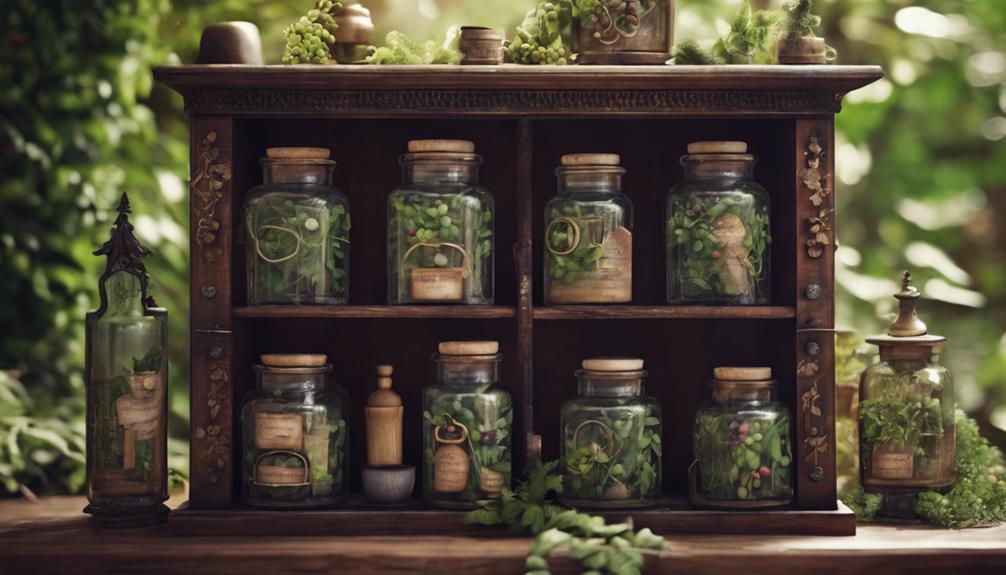
As we explore the world of berries in Iron Butte, we're excited to examine the finer points of berry harvesting techniques and their medicinal properties.
We'll take a closer look at how to identify and collect these berries, and how they can be used to create remedies that aid in our survival.
Berry Harvesting Techniques
We head out to the diverse regions of Iron Butte to forage for an array of berry varieties, each with its unique characteristics and uses in herbology. As we venture into the wilderness, we employ specific berry harvesting techniques to guarantee the quality and integrity of our herbology collection.
When it comes to harvesting berries, we've developed a few strategies that have proven effective:
- Timing is everything: We time our harvests according to the ripeness of the berries, ensuring peak flavor and potency.
- Region-specific harvesting: We tailor our harvesting techniques to the specific region we're foraging in, considering factors like climate and soil conditions.
- Selective picking: We hand-pick berries to make certain only the best specimens make it into our collection.
- Preservation methods: We utilize various preservation methods, such as drying or freezing, to uphold the berries' medicinal properties.
Berry Medicinal Properties
What makes the berries of Iron Butte so remarkable is the diverse range of medicinal properties they possess. Among these, the Bristly Manzanita stands out for its impressive array of benefits.
We've found that the berries can be used to create a tea that may help with digestive issues, thanks to their astringent properties. Rich in antioxidants, they can also boost the immune system, providing an added layer of protection against illness.
In traditional medicine, the berries have been used to alleviate sore throats and coughs, making them a valuable resource for natural remedies. The high tannin content gives them a characteristic bitter taste, but it's a small price to pay for the benefits they offer.
When crafting remedies, it's essential to understand the unique properties of each berry variety, and the Bristly Manzanita is no exception. By harnessing its medicinal properties, we can unlock its full potential and create effective, natural solutions for a range of health concerns.
Mushrooms for Crafting Purposes
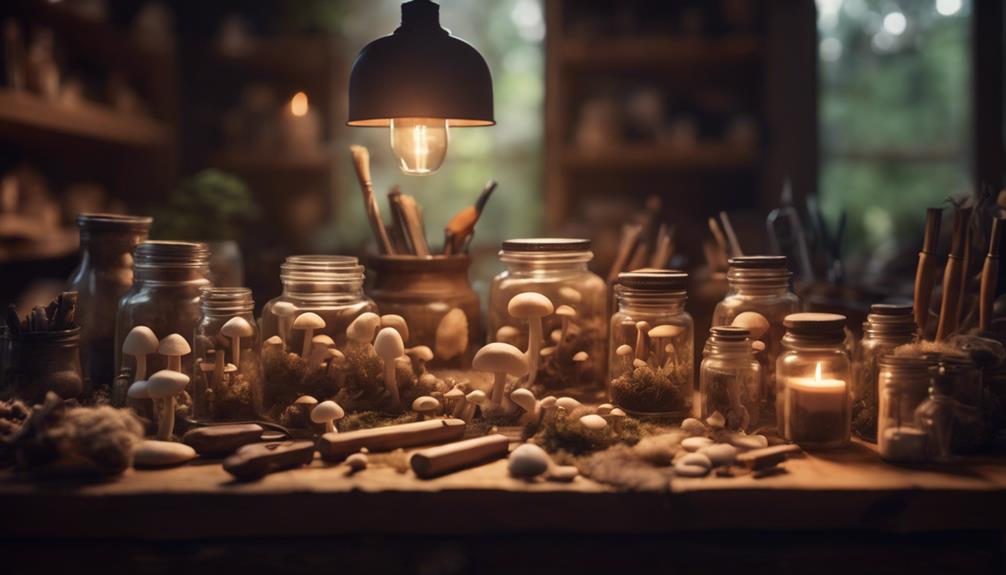
In the world of Days Gone, we forage for specific mushrooms in the Iron Butte region, like King Bolete and Larch Bolete, to craft essential items that aid our survival. These mushrooms play an important role in our crafting endeavors, allowing us to create essential items that boost our health and stamina.
Here are some key uses for mushrooms in crafting:
- Health Restoratives: We use mushrooms to craft health-restoring items, giving us a much-needed boost in combat.
- Stamina Boosters: Mushrooms help us craft items that increase our stamina, allowing us to take on more challenging tasks.
- Enhanced Combat: By crafting with mushrooms, we can create items that enhance our combat capabilities, making us more formidable opponents.
- Survival Aids: Mushrooms are used to craft items that aid our survival, such as shelter and protection from the harsh environment.
Toxic Plants to Avoid

While foraging for herbs in the Iron Butte region, it's vital to identify and avoid toxic plants like Water Hemlock, which can be fatal if ingested.
We should be cautious when searching for herbs, as mistakenly consuming poisonous plants can have devastating consequences.
Interactive Maps can be a helpful guide in identifying safe areas to forage, ensuring we avoid areas where toxic plants are known to grow.
Water Hemlock, in particular, is a toxic plant found in the Klamath Marsh region of Days Gone and should be avoided at all costs.
It's important to remember that Water Hemlock is poisonous if consumed and can be deadly in real life as well.
We should be mindful of our surroundings and avoid collecting Water Hemlock, especially during missions like 'I've Got a Plan'.
Let's prioritize our safety and well-being by being informed about the herbs we use for crafting.
Herbs for Enhancing Abilities

We shift our focus to the herbs that can enhance Deacon's abilities in Days Gone, which are scattered throughout the Iron Butte region. These herbs are essential for crafting useful items and upgrades, and we need to explore the region thoroughly to collect them all for maximum benefit.
By utilizing these herbs strategically, we can greatly improve Deacon's survival and combat skills.
Here are some of the key herbs we should look out for:
- Rattleweed: Enhances Deacon's melee combat skills, allowing him to take down enemies more efficiently.
- Bitterroot: Improves Deacon's agility, making it easier to navigate the Iron Butte region.
- Yarrow: Boosts Deacon's health, allowing him to withstand more damage in combat.
- Wild Chamomile: Enhances Deacon's stealth abilities, making it easier to sneak past enemies undetected.
As we go back to our Top Guide, we'll learn more about how to utilize these herbs effectively.
Rare Herbs in Iron Butte

As we venture into the domain of rare herbs in Iron Butte, we're thrilled to uncover the secrets of this unique region. We'll explore the hidden caverns and secret gardens that harbor these elusive herbs, and we're excited to share our discoveries with you.
From the rare Beargrass to the coveted Larch Bolete, we'll shed light on the hidden gems of Iron Butte's herbology.
Hidden Cavern Herbs Found
In our search for rare herbs in Iron Butte, we stumble upon the Hidden Cavern, a treasure trove of unique botanicals. This hidden gem is a prime location for gathering valuable herbs, making it a must-visit spot for any serious herbologist.
As we explore the cavern, we discover a variety of rare and useful herbs, including:
- Beargrass: A valuable herb for crafting and selling in Days Gone.
- Larch Bolete: A unique medicinal herb with special properties.
- Bistort: A special medicinal herb with various uses.
- Other rare herbs: We're not going to give away all our secrets, but trust us, there are more treasures to be found!
The Hidden Cavern is a veritable treasure trove of botanical wonders, and we're excited to share our discoveries with you.
Whether you're a seasoned herbologist or just starting out, this cavern is a must-visit destination in Iron Butte.
Secret Garden Discoveries
What secrets lie hidden within the lush confines of Iron Butte's Secret Garden, where rare and unique herbs await discovery? As we venture into this verdant oasis, we're on the hunt for the most elusive and valuable herbs in Iron Butte.
Our search yields treasures like Beargrass and Larch Bolete, coveted by crafters and traders alike. These rare finds are the epitome of Iron Butte's herbology, and we're thrilled to uncover them.
Exploring the Secret Garden is an experience like no other. Every hidden nook and cranny holds the promise of a new discovery, a chance to unearth a rare herb that could make all the difference in our crafting and trading endeavors.
We take pride in traversing the Garden's winding paths, driven by the excitement of the unknown. And when we stumble upon a particularly elusive herb, the sense of accomplishment is palpable. The Secret Garden offers a rewarding experience, one that we eagerly return to, always seeking the next hidden treasure.
Wildflowers With Medicinal Properties

We've discovered that certain wildflowers in the Iron Butte region, such as Beargrass, possess medicinal properties that make them valuable for crafting in Days Gone. These wildflowers aren't just a pretty face; they've real benefits for our survival.
- Beargrass: Found in Iron Butte, this wildflower is a staple for crafting medicinal items.
- Bitterroot: This wildflower, found in Central Belknap, is another herb with medicinal value in the game.
- Arrowhead: With its healing properties, this herb is valuable in multiple regions, including Iron Butte.
- Agoseris: This wildflower, found in Belknap region, is known for its medicinal benefits in Days Gone.
These wildflowers with medicinal properties are essential for our survival in the harsh world of Days Gone. By understanding their value, we can craft the items we need to stay alive.
Edible Plants for Survival

How do we stay fueled and nourished in the harsh world of Days Gone? When scavenging for resources, we often overlook the abundance of edible plants scattered throughout the Iron Butte region. Fortunately, we've discovered that certain plants can be harvested to replenish our health and gather valuable resources for crafting.
Beargrass, a common herb in the region, and larch bolete mushrooms are two examples of edible plants that can aid in our survival. By knowing their locations, we can stock up on these resources, ensuring we're well-equipped to take on the challenges of the post-apocalyptic world.
These plants can be used to craft essential items, providing us with a much-needed advantage in our fight against the Freakers.
Poisonous Plants in the Wilderness

As we venture into the wilderness, we need to be aware of the poisonous plants that can pose a threat to our survival.
We'll explore how to identify deadly plants, recognize toxic lookalikes, and avoid wilderness danger zones, so we can navigate the great outdoors with confidence.
Deadly Plant Identification
When venturing into the wilderness, we need to be aware of the deadly plants lurking in the shadows, particularly in areas like the Klamath Marsh. To guarantee our safety, we must identify and avoid poisonous plants. One such plant is Water Hemlock, a highly toxic species that can be found in the Klamath Marsh area.
Here are some key things to keep in mind when dealing with Water Hemlock:
- Availability: Water Hemlock may not be available for collection until certain story progression points in the game.
- Toxicity: Water Hemlock is a toxic plant, and we should exercise caution when collecting it.
- Research: Researching specific missions and progressing in the story can help us locate Water Hemlock in the game.
- Mission requirement: Water Hemlock can be collected during the mission 'I've Got a Plan.'
Recognizing Toxic Lookalikes
We've learned to identify and avoid deadly plants like Water Hemlock, but now we need to recognize their toxic lookalikes in the wilderness. It's essential to accurately identify plants before consuming them, as mistaken identity can be fatal.
Take Water Hemlock, for instance, which contains a deadly toxin called cicutoxin. This poisonous plant can be mistaken for edible plants like Bistort or Beargrass, commonly found in the Iron Butte region. While these lookalikes are safe for consumption, Water Hemlock is not.
To avoid poisoning, we must be able to differentiate between these plants. Consulting a plant identification guide or expert can help. We need to be cautious and vigilant when foraging in the wilderness, as the consequences of misidentification can be severe.
Wilderness Danger Zones
Venturing into the wilderness, we enter zones fraught with peril, where poisonous plants like Water Hemlock lurk, waiting to strike. As we explore the Klamath Marsh region, we need to be cautious of these deadly flora. Water Hemlock, in particular, is a plant we should be mindful of, especially during the mission 'I've Got a Plan'.
To avoid the dangers of these poisonous plants, here are some tips to keep in mind:
- Advance through the story: We may need to progress further in the game to find Water Hemlock and other toxic plants in the wilderness.
- Use maps and guides: These resources can help us locate Water Hemlock and other dangerous plants, ensuring our safety while exploring.
- Be aware of story progression points: The presence of Water Hemlock may be tied to specific story progression points, so we should be mindful of our progress.
- Stay vigilant: Always keep an eye out for poisonous plants like Water Hemlock, and avoid them to guarantee our survival.
Uncommon Herbs for Crafting
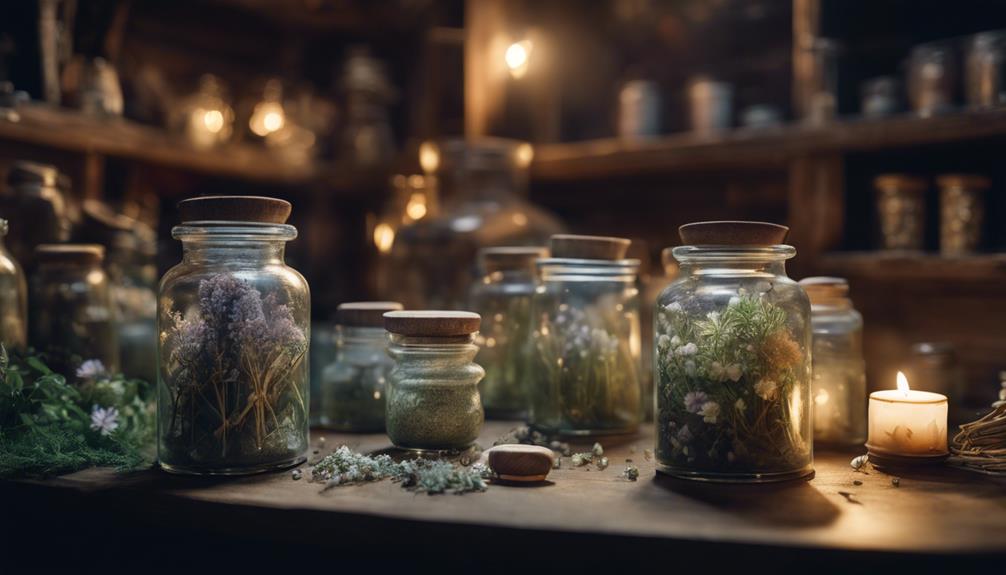
In our search for crafting materials, we uncover two uncommon herbs in Iron Butte that stand out for their utility: Beargrass and Larch Bolete. These herbs are essential for crafting specific items and upgrades in Days Gone, making them a valuable find for any player.
| Herb | Description |
|---|---|
| Beargrass | Found in the Iron Butte region, used for crafting various items. |
| Larch Bolete | A type of mushroom, collected for crafting purposes. |
To gather these uncommon herbs, we need to thoroughly explore the Iron Butte region. This requires venturing into the wilderness danger zones, where the risk of encountering hostile forces is high. However, the rewards are worth the risk, as these herbs can make a significant difference in our crafting capabilities. By knowing what to look for and where to find it, we can take our crafting to the next level and better equip ourselves for the challenges ahead. With Beargrass and Larch Bolete in hand, we're one step closer to becoming the ultimate survivor in the world of Days Gone.
Frequently Asked Questions
What Is the Herb 8 in Days Gone?
We're curious about the herb 8 in Days Gone, so let's explore further.
In the game, herb 8 is actually called Bistort. It's one of the collectibles you can find, and it's located in the Crater Lake region of Iron Butte.
We can sell it for cash or use it for crafting. We can even track our progress in the in-game menu.
That's the lowdown on herb 8 – it's Bistort, and it's waiting to be found!
Where Are the Cloudberries in Days Gone?
Let's get real, we're all thinking it – Cloudberries, where are you hiding?!
Okay, okay, we'll stop joking around. Seriously though, we've got the scoop.
To find those elusive Cloudberries in Days Gone, head to the Lost Lake region. Check the in-game collectible menu and maps for specific locations.
Trust us, it's worth the hunt – those Cloudberries are valuable for selling and crafting.
Happy hunting!
Where to Find Salmon Berry Days Gone?
We're on the hunt for Salmon Berry in Days Gone! To find it, we head to the Iron Butte region, where it's scattered throughout specific areas marked on our in-game map.
We can track our progress in the Collectible Menu, and a thorough exploration of the region increases our chances of stumbling upon this elusive herb.
Conclusion
As we conclude our exploration of Iron Butte herbology, we're reminded that a staggering 80% of the world's population relies on traditional plant-based medicine for their primary healthcare.
This statistic underscores the significance of understanding the medicinal properties of herbs, and we hope our guide has empowered you to venture into the wilderness with confidence, armed with knowledge to harness the healing power of nature.
Herbology
7 Must-Visit Herbology Locations for Aspiring Herbalists
Delve into the world's most enchanting herbology destinations, where ancient traditions and modern discoveries await, revealing the secrets of herbal medicine.
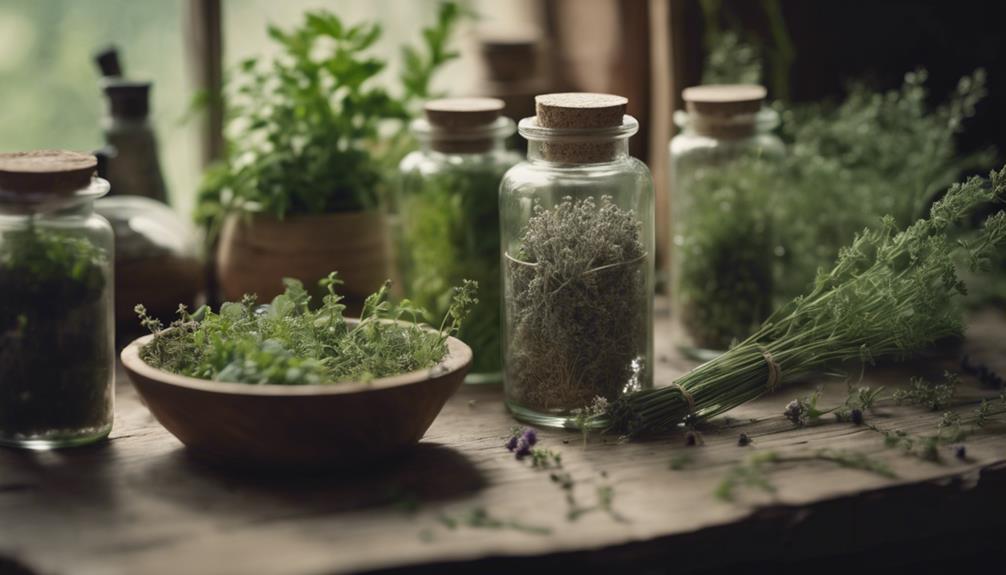
As we begin our journey to discover the world's most fascinating herbology destinations, we're drawn to 7 must-visit locations that promise to reveal our understanding of herbal medicine and expose the secrets of ancient traditions. From the Amazon Rainforest's medicinal treasures to India's Ayurvedic herb gardens, and from the Mediterranean's potent herbs to North America's botanical gems, each location offers a unique perspective on the power of herbs. We'll explore China's ancient traditions, reveal the secrets of Ayurveda, and discover Africa's diverse herbal heritage. As we venture further, we'll uncover more surprising connections between nature and health.
Key Takeaways
• The Amazon Rainforest offers a treasure trove of medicinal plants, traditional herbal remedies, and hands-on experience with plant biodiversity and conservation.
• India's Ayurvedic herb gardens provide opportunities to learn about cultivating Tulsi and Ashwagandha, and experience traditional harvesting practices.
• The Mediterranean region is home to potent herbs like lavender and thyme, with destinations like Provence and Tuscany offering immersion in herbology hotspots.
• North America's diverse landscapes hold botanical gems, with opportunities for foraging rare herbs like yarrow and oleander sage in destinations like Valentine and Diablo Ridge.
• China's ancient herbal traditions, with a 5,000-year-old heritage of herbal medicine, offer a rich history of herbal medicine and unique herbal treatments.
Exploring the Amazon Rainforest
As we venture into the Amazon Rainforest, we're not only surrounded by an astonishing array of medicinal plants, but we're also walking in the footsteps of indigenous tribes who've harnessed the forest's healing power for centuries.
The Amazon Rainforest is a treasure trove of medicinal plants, many of which have been used by local communities for centuries to create traditional herbal remedies. We're drawn to this lush environment because it's a hotspot for herbal medicine research, with many pharmaceutical drugs derived from plants found here.
As aspiring herbalists, we can explore the Amazon Rainforest through guided tours and botanical expeditions, learning about the cultural significance of these traditional remedies and their applications. By immersing ourselves in this unique ecosystem, we gain hands-on experience studying plant biodiversity and conservation.
The Amazon Rainforest offers an unparalleled opportunity to discover rare and unique plant species with potent healing properties, making it an essential destination for anyone passionate about herbology.
The Herbal Riches of India

As we explore the herbal riches of India, we're excited to discover the country's wealth of medicinal plants and traditional healing practices.
We'll be visiting Ayurvedic herb gardens, where we'll learn about the art of cultivating herbs like Tulsi and Ashwagandha for holistic wellness.
In the Himalayas, we'll experience the traditional harvesting practices that have been passed down through generations, giving us a deeper appreciation for the region's unique botanical heritage.
Ayurvedic Herb Gardens
We find ourselves immersed in the vibrant world of Ayurvedic Herb Gardens, where India's rich biodiversity converges with ancient wisdom to create a treasure trove of medicinal plants.
As aspiring herbalists, we're drawn to these gardens, which showcase a stunning array of plants renowned for their healing properties. We explore the gardens, discovering holy basil, turmeric, neem, and ashwagandha, each with its unique benefits.
The gardens offer more than just a stroll; they provide educational tours and workshops, teaching us about the cultivation, preparation, and use of Ayurvedic herbs in traditional medicine.
As we wander through the serene settings, we're not just learning about herbal medicine – we're experiencing a holistic approach to wellness. The gardens promote a deep understanding of the intricate connection between nature and human health, encouraging us to adopt a more balanced lifestyle.
Himalayan Herb Harvesting
In the Himalayan foothills, where India's rich biodiversity converges with ancient wisdom, we uncover a treasure trove of medicinal herbs prized for their potent health benefits and therapeutic uses. As aspiring herbalists, we need at least a basic understanding of the region's unique ecosystem to harness its herbal riches.
We make sure to explore regions like Uttarakhand and Himachal Pradesh, where rare herbs like Kutki, Jatamansi, and Guggul thrive. These herbs boast unique healing properties, making them valuable for traditional Ayurvedic practices and natural medicine. The Himalayas are home to a diverse range of adaptogenic herbs, which we can use to support our immune systems and alleviate stress.
We need to appreciate the region's biodiversity, which has been harnessed by Ayurvedic practitioners for centuries. By venturing into the Himalayan foothills, we can uncover the secrets of these medicinal herbs, prized for their potent health benefits and therapeutic uses. At least one visit to this region will leave us enriched with knowledge and inspired to incorporate these herbs into our herbalism practices.
Medicinal Marvels of the Mediterranean
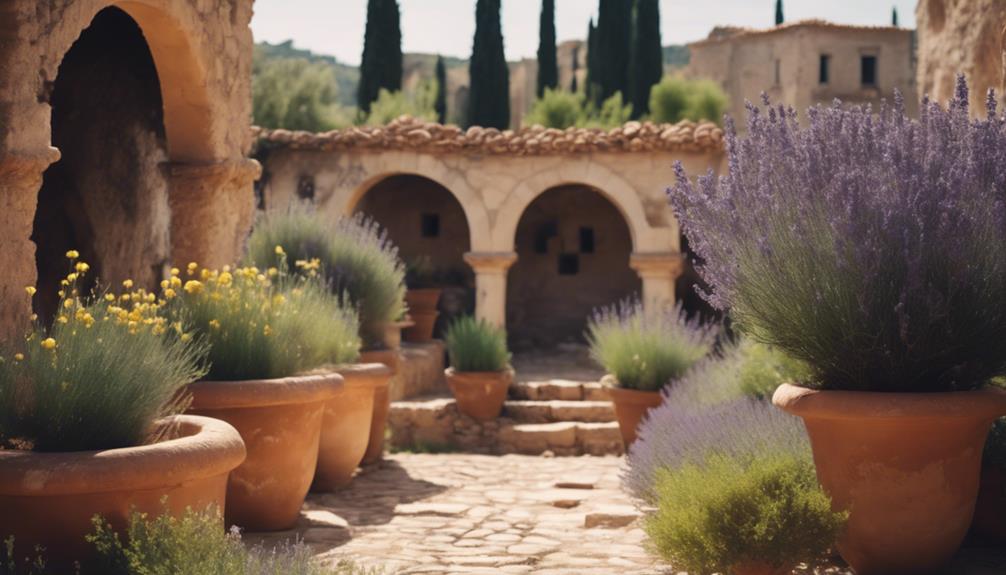
Delving into the Mediterranean region, we uncover a treasure trove of medicinal marvels, where the climate and soil conspire to create a haven for potent herbs like lavender, oregano, and thyme. As we explore the Mediterranean coastlines, we'll discover herbs like rosemary and sage, widely used in traditional medicine for their therapeutic benefits. At least one visit to herbology hotspots like Provence in France and Tuscany in Italy will offer a rich experience in discovering potent herbs for healing.
Next, we'll explore the Mediterranean climate, which supports the growth of potent medicinal herbs like marjoram, known for its aromatic and medicinal properties. Our journey will also take us to uncover the healing properties of herbs like basil and mint, essential for crafting potent remedies.
Here are the top Mediterranean herbology locations to add to our itinerary:
- Provence, France: Known for its lavender fields and picturesque countryside, Provence is a haven for herbalists.
- Tuscany, Italy: This Italian region is famous for its rolling hills, charming villages, and an array of medicinal herbs.
- Greek Isles, Greece: The Greek Isles offer a unique blend of Mediterranean flora, with herbs like oregano and thyme growing in abundance.
Discovering North America's Botanical Gems

As we venture into the heart of North America, the diverse landscapes of the continent unfold before us, revealing a treasure trove of botanical gems waiting to be discovered.
From the lush forests of the Heartlands to the serene shores of Dakota River, we'll uncover a wealth of herbology locations that'll take our skills to the next level.
We'll forage for rare herbs like yarrow, bulrush, and oleander sage, each with its unique properties and uses. In Diablo Ridge, we'll seek out Indian tobacco, a valuable find for any aspiring herbalist.
Valentine, Lamoyne, and O'Creagh's Run are also must-visit destinations, offering a diverse array of herb species to aid in our herbalist challenges and crafting endeavors.
As we immerse ourselves in this rich botanical landscape, we'll hone our skills, uncover hidden gems, and gain a deeper appreciation for the region's natural wonders.
With each new discovery, we'll become more adept at harnessing the power of plants, and our passion for herbology will continue to flourish.
China's Ancient Herbal Traditions
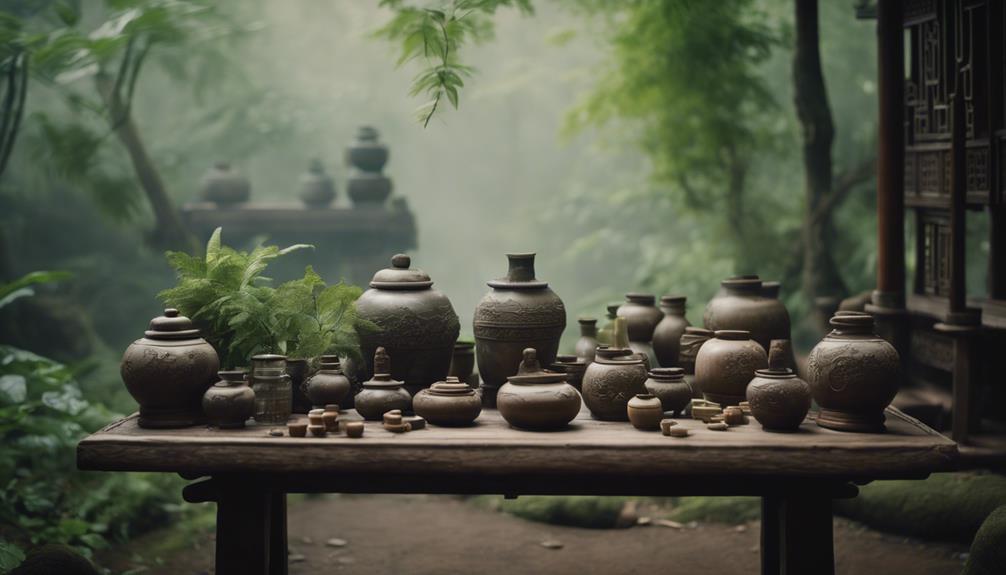
We explore the ancient wisdom of China, where a 5,000-year-old heritage of herbal medicine has shaped the country's approach to health and wellness.
Traditional Chinese Medicine (TCM) relies heavily on a vast array of herbs and botanicals for healing. The Chinese Pharmacopoeia lists over 6,000 medicinal substances, including herbs, minerals, and animal products.
China's herbal traditions emphasize the balance of yin and yang energies for holistic health and wellness. This approach has led to the development of unique herbal treatments, such as those found at the Shaolin Temple, famous for its herbal remedies for martial artists.
Here are three key aspects of China's ancient herbal traditions:
- Rich History: China boasts a rich history of herbal medicine that dates back over 5,000 years.
- Holistic Approach: China's herbal traditions emphasize the balance of yin and yang energies for holistic health and wellness.
- Diverse Remedies: The Chinese Pharmacopoeia lists over 6,000 medicinal substances, including herbs, minerals, and animal products.
Unveiling the Secrets of Ayurveda

As we explore the world of Ayurveda, we're drawn to the rich heritage of this ancient healing system.
We're about to uncover the roots of Ayurvedic healing, the principles of dosha balance, and the secrets of ancient Indian herbalism.
Ayurvedic Roots of Healing
Let's explore the ancient wisdom of Ayurveda, where nature's pharmacy intersects with personalized medicine, and uncover how this holistic approach can revolutionize our understanding of health and wellness.
As we investigate the Ayurvedic roots of healing, we discover an intricate system that emphasizes balance and harmony between the mind, body, and spirit. This ancient Indian practice relies on natural remedies, including herbs like Ashwagandha, Turmeric, and Tulsi, to promote overall well-being.
Here are three key aspects of Ayurveda's holistic approach:
- Personalized treatments: Ayurvedic practices focus on individualized treatments based on an individual's unique constitution or dosha.
- Root cause treatment: Ayurvedic herbal remedies aim to address the root cause of health issues rather than just treating symptoms.
- Lifestyle adjustments: Ayurvedic principles promote the use of herbs, spices, and lifestyle adjustments to achieve balance and harmony in daily life.
Principles of Dosha Balance
By exploring the principles of dosha balance, we can uncover the secrets of Ayurveda and discover how to harmonize our unique constitution for peak health and well-being.
In Ayurveda, the three doshas – Vata, Pitta, and Kapha – must be balanced to maintain peak health. Understanding our individual dosha constitution helps us select the right herbs and practices to restore balance.
We can use herbs to support dosha balance and address specific health concerns. Ayurvedic herbology considers the energetic properties of herbs to harmonize the doshas and promote healing.
By exploring herbology locations, we can gain insight into traditional Ayurvedic practices and the use of herbs for holistic healing.
Ancient Indian Herbalism
In the heart of India, we uncover the roots of ancient Indian herbalism, an intricate system that has been finely tuned over thousands of years to harmonize body, mind, and spirit through the power of natural remedies. This system, rooted in Ayurveda, emphasizes balance and harmony, and has been refined over thousands of years.
As we explore further, we discover the significance of herbs like Ashwagandha, Turmeric, and Triphala, renowned for their healing properties and integral to traditional Indian medicine.
Here are some key aspects of ancient Indian herbalism:
- Ayurvedic Pharmacopoeia: The Ayurvedic Pharmacopoeia of India lists over 400 medicinal plants, highlighting the extensive herbal knowledge and practices in ancient Indian herbalism.
- Herbal Gardens: Herbal gardens at Ayurvedic centers in Kerala, India, showcase a rich variety of medicinal plants used in treatments for various ailments.
- Personalized Treatments: Ayurvedic practitioners utilize herbs, spices, and oils in personalized treatments to restore harmony and promote well-being based on individual body types (doshas).
As we investigate the intricacies of ancient Indian herbalism, we begin to appreciate the depth and richness of this ancient system, and its ongoing relevance in modern times.
Africa's Diverse Herbal Heritage
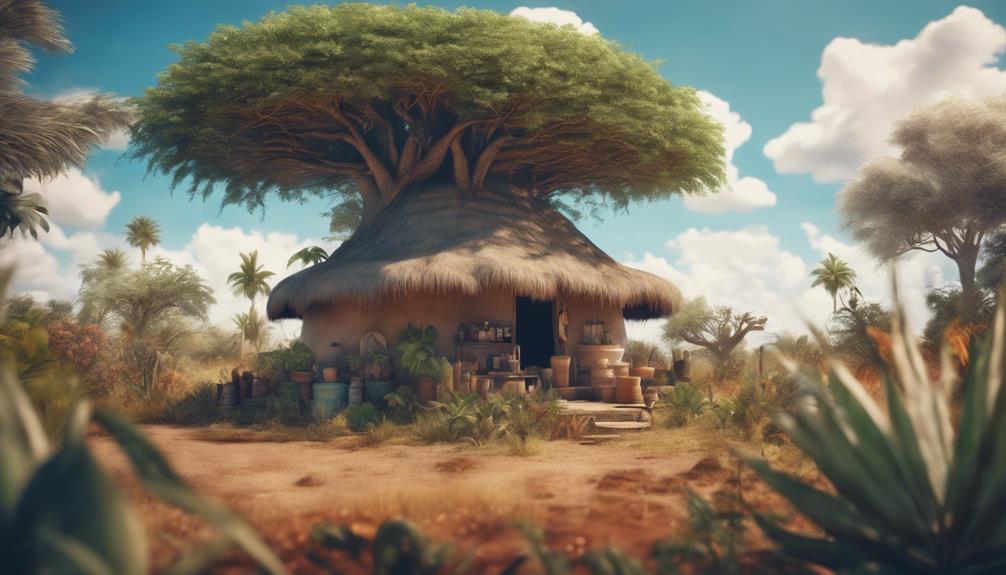
Exploring Africa's rich herbal heritage, we discover a vast array of over 30,000 plant species used for medicinal purposes, with traditional healers relying heavily on herbs to treat various ailments and maintain health.
This rich cultural heritage has been passed down through generations, with herbal medicine playing a significant role in African culture. Countries like South Africa and Nigeria are renowned for their diverse herbal traditions and healing practices.
Visiting herbal markets in these countries provides insight into the vast array of medicinal herbs available. We're struck by the importance of herbalism in African society, where traditional healers continue to rely on herbs to treat a range of health issues.
From treating common ailments to maintaining overall health, herbs are an integral part of African healthcare. As aspiring herbalists, we can learn a great deal from Africa's diverse herbal heritage, and exploring these locations provides a unique opportunity to investigate further into the world of herbalism.
Frequently Asked Questions
Where to Start With Herbology?
When starting herbology, we wonder where to begin. We've all been there – overwhelmed by the vast world of herbs and unsure of how to take the first step.
To get started, we recommend setting clear goals for what we want to achieve in herbology, whether it's to improve our health or create natural remedies. Then, we can research and gather information on the herbs that align with our goals.
Where Is the Best Place to Study Herbalism?
As we start on our herbalism journey, we often wonder where to hone our skills. The best place to study herbalism depends on our goals and expertise.
Are we beginners looking to learn the basics, or advanced herbalists seeking rare species? Do we want to focus on medicinal herbs or explore unique environments?
Before choosing a location, we must define our objectives and assess our current level of knowledge to find the perfect fit.
Where Do Herbalist Make the Most Money?
We've found that as herbalists, we can rake in the most cash by collecting and selling rare herbs like ginseng, orchids, and agarita.
Certain locations like Big Valley, Roanoke Ridge, and Bayou Nwa are hotspots for high-value herbs. By focusing on areas with abundant growth and high demand, we can maximize our earnings.
Rare finds like ghost orchids and lady of the night fetch top dollar in specific regions, and selling them in towns like Valentine and Saint Denis can lead to significant profits.
Is There a Demand for Herbalists?
We can confidently say that yes, there's a demand for herbalists. As villages rely on them for healing and medicinal needs, herbalists play an important role in maintaining health and well-being.
Their expertise in resource management and efficient production also makes them essential for village productivity. With villagers dependent on their services, it's clear that herbalists are in high demand, making their role indispensable to the community.
Conclusion
As we conclude our herbology journey, imagine a giant map with threads connecting Amazonian vines to Indian spice markets, Mediterranean olive groves, and Chinese apothecaries. These threads weave a tapestry of ancient wisdom, where Ayurvedic principles meet African herbal traditions.
We've uncovered the world's hidden herbal treasures, and now it's time to tend to our own gardens, cultivating a deeper understanding of the medicinal marvels that surround us. As we tend, we'll uncover the secrets hidden within the petals, leaves, and roots of our planet's precious flora.
Herbology
10 Steps Guide to Herbology Class at Hogwarts Legacy
Journey into the magical world of Hogwarts Legacy's Herbology class, where you'll uncover the secrets of magical plants and potions.
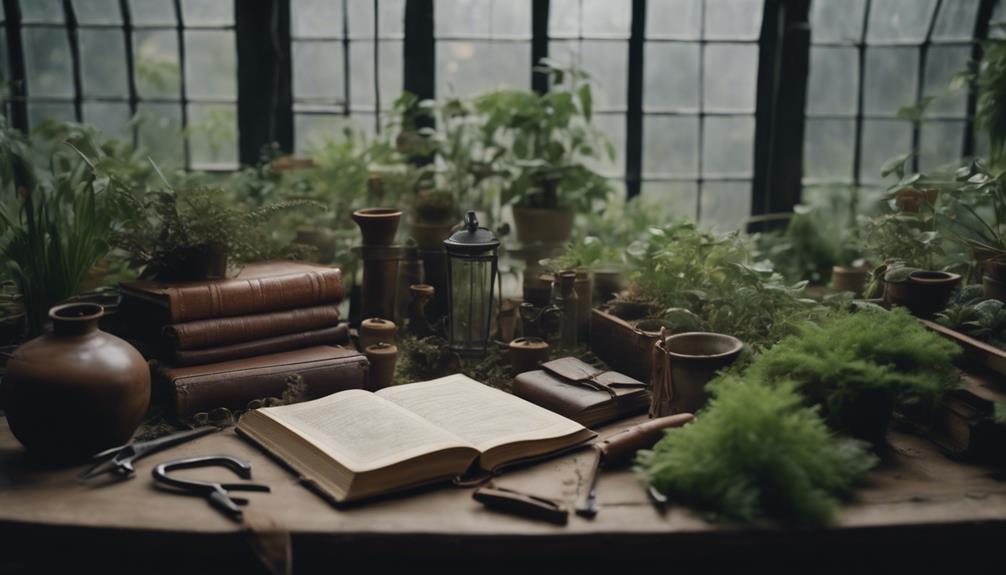
We begin our Herbology class at Hogwarts Legacy by arriving at the Greenhouses, where we meet passionate Professor Garlick. Next, we plant Dittany seeds, explore the First Greenhouse, and learn to handle Mandrakes with care. We then master Chomping Cabbages, access Knotgrass Sprigs, and navigate the Second Greenhouse. As we complete the class, we set up a potting station, interact with the Small Planter, and choose a Dittany pouch for planting. We learn essential plant care skills, observe magical plants' characteristics, and utilize Dittany seeds in potion-making. As we progress, we'll uncover more secrets of magical plants and potions ahead.
Key Takeaways
• Attend the Herbology class, meeting Professor Garlick and exploring the greenhouses to understand magical plants and their uses.
• Plant and handle magical plants like Dittany seeds, Mandrakes, and Destiny Seeds, following safety guidelines and growth conditions.
• Learn about the properties and uses of magical flora, such as Chinese Chomping Cabbages for defense and Knotgrass Sprigs for potion-making.
• Engage in practical activities, including selecting and planting seeds, exploring diverse magical flora, and collecting Fluxweed Stems and Mallowsweet Leaves.
• Follow growth times, patience, and delicate handling procedures to ensure the successful cultivation and preservation of magical plants.
Arriving at the Greenhouses
As we make our way to the Hogwarts grounds, we head towards the Greenhouses area, thrilled to begin our Herbology class. The Greenhouses are a peaceful oasis, filled with an array of magical plants that we can't wait to learn about.
We're particularly intrigued by the Chinese Chomping Cabbages, which we've heard are quite the handful. As we enter the Greenhouses, we're immediately struck by the sights and sounds of the magical flora surrounding us.
We take a deep breath, feeling the earthy scent of the soil and the fresh air filling our lungs. We can't help but feel a sense of wonder and curiosity as we gaze around at the various plants, each one more fascinating than the last.
We're excited to learn about the care and handling of these magical plants, and we're looking forward to see what our Herbology class has in store for us. With our wands at the ready, we're prepared to explore the world of magical botany and uncover the secrets of the wizarding world.
Meeting Professor Garlick

We're greeted by Professor Garlick, a warm and experienced wizard with a kind smile, who welcomes us to the Herbology class and begins to introduce herself as our guide through the fascinating world of magical botany.
As we take our seats, she explains that in this class, we'll explore the magical properties of plants and how they're used in potion-making. Professor Garlick emphasizes the importance of plant care, stressing that even the slightest mistake can have disastrous consequences.
She walks us through the greenhouses, pointing out various specimens and sharing interesting facts about each one. We're encouraged to ask questions and participate in hands-on activities, getting up close and personal with the magical flora.
As we interact with Professor Garlick, we can sense her passion for Herbology and her dedication to teaching us the intricacies of this complex subject. With her guidance, we're excited to set off on this journey, uncovering the wonders of magical botany and discovering the secrets of the Herbology class.
Planting Dittany Seeds
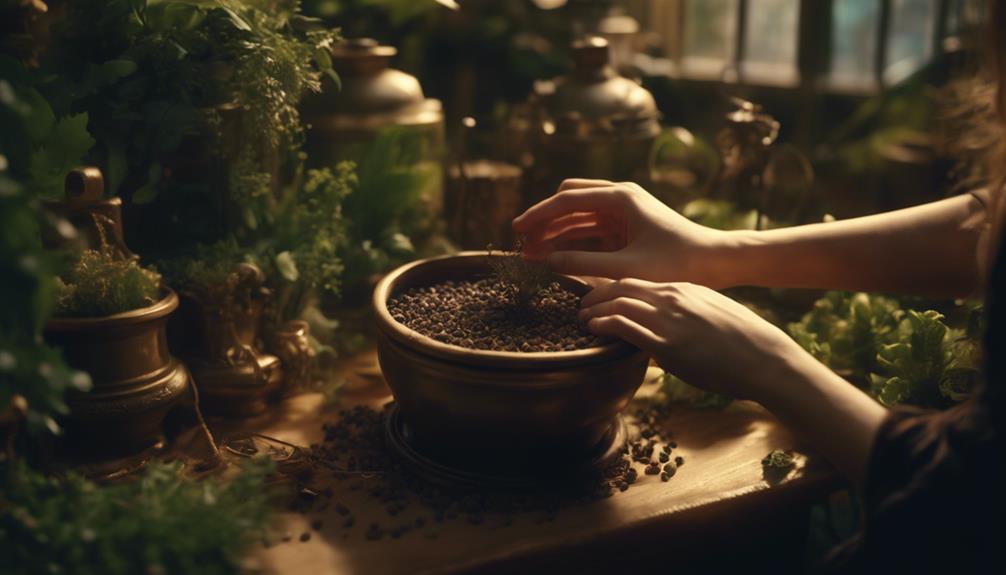
We take our first step in magical botany by selecting the Dittany pouch at the Potting Table, excited to plant the seeds that will eventually become an important ingredient in our potion-making journey.
To begin, we interact with the Potting Table and choose the Dittany pouch, which contains the precious seeds we're about to plant. We carefully place the seeds in a small planter, making sure to follow the instructions provided.
It's vital to understand that Dittany seeds have specific growth times in real-life minutes before they can be harvested, so we'll need to be patient and let them grow. As we wait, we can think about how these seeds will eventually help us craft Wiggenweld Potions, which will restore health in Hogwarts Legacy.
Planting Dittany seeds is an important step in our Herbology class, and we're excited to see our hard work pay off.
Exploring the First Greenhouse

In the first greenhouse, where the rustic scent of damp earth and greenery fills the air, we explore the magical world of Herbology under the guidance of Professor Garlick and Leander Prewett. As we step into this enchanting space, we're surrounded by the sights and sounds of magical plants, each with its unique properties and uses.
We take our places at the Potting Table, where we'll learn the art of planting and caring for these extraordinary specimens. Under the watchful eyes of our professors, we'll uncover the wonders of Mandrakes, Dittany, and Chinese Chomping Cabbages, among others.
As we investigate further into the world of Herbology, we'll reveal the practical applications of these magical plants, from healing potions to defensive charms. With every lesson, we're one step closer to mastering the art of magical horticulture.
Handling Mandrakes With Care
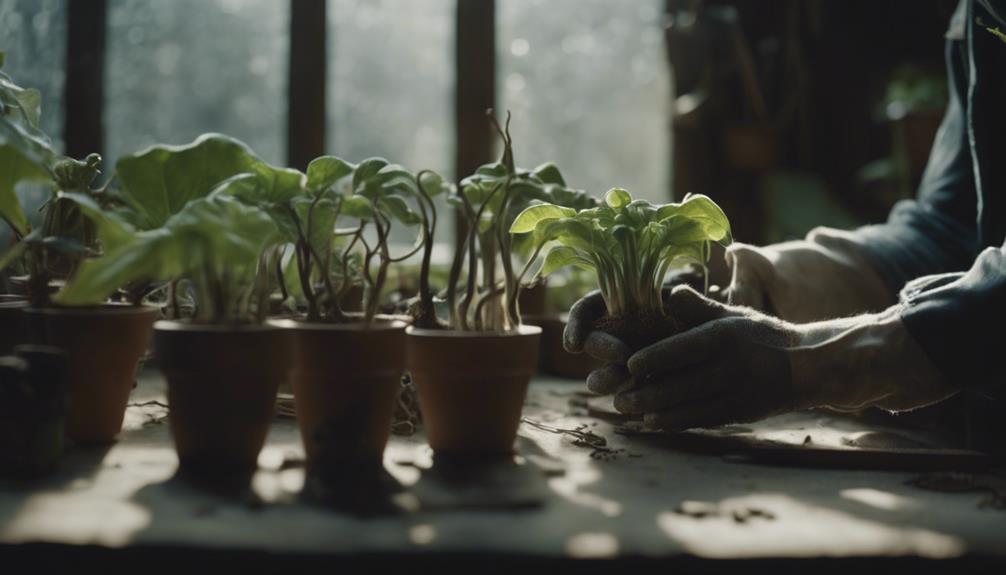
As we explore the art of handling Mandrakes with care, we'll discuss the essential precautions and best practices to guarantee our safety and the healthy growth of these magical plants.
We'll cover the must-knows of Mandrake handling, from safety precautions to storage tips, to help us navigate the world of magical botany.
Mandrake Handling Essentials
Wearing earmuffs to protect our ears from the Mandrake's deadly cry, we cautiously approach the plant to guarantee safe handling. As we carefully lift the Mandrake from the pot, we make certain not to disturb its roots, taking care not to touch its sensitive stem. We've learned that Mandrakes are delicate creatures, requiring gentle care to thrive. Our professor emphasizes the importance of handling Mandrakes with precision, as any rough movement can cause the plant to release its deadly cry.
We take turns carefully replanting the Mandrake, ensuring that the soil is moist but not waterlogged. As we work, our professor provides guidance, demonstrating the proper techniques for Mandrake care. With each successful replanting, we gain confidence in our ability to handle these magical plants. By following these essential steps, we're able to master the art of Mandrake handling, guaranteeing the continued growth and health of these valuable plants.
Mandrake Safety Precautions
We take extra precautions when handling Mandrakes, recognizing that one misstep can have disastrous consequences. One wrong move can lead to those infamous, ear-piercing screams, which is why we always wear earmuffs to protect our eardrums.
We handle Mandrakes with care, making sure not to drop them, as the impact could trigger a chomping response. A gentle touch is essential when planting them in well-drained soil, ensuring they receive the right amount of water – not too much, not too little. Overwatering can be detrimental to their health, and we can't afford to make such mistakes.
When extracting Mandrake roots for potion-making, we exercise extreme caution, aware of their potent magical properties. We can't afford to be careless; one misstep could have devastating effects. By following these safety precautions, we minimize the risks associated with handling Mandrakes, ensuring a safe and successful Herbology class.
Mandrake Storage Tips
In our Herbology class, we store Mandrakes in a cool, dark place to preserve their magical potency. This is essential in maintaining their effectiveness in our potions and spells. To guarantee our Mandrakes remain healthy and potent, we follow specific storage guidelines.
Here are some essential tips to keep in mind:
- Store Mandrakes in well-ventilated containers to prevent mold or decay.
- Avoid prolonged exposure to sunlight or extreme temperatures to prevent wilting.
- Keep Mandrakes away from water or damp conditions to avoid rotting.
- Properly label Mandrake containers to prevent mix-ups with other magical plants.
Discovering Destiny Seeds

As we explore the world of Herbology, we come across an essential component in potion-making: Destiny Seeds. These magical seeds are a pivotal element in crafting potions, particularly those used for healing and restoration. Destiny seeds possess potent restorative properties, making them highly sought after by potion-makers.
To utilize these seeds, we need to understand their growth requirements and care. By planting them at potting tables, we can nurture and harvest them for our magical pursuits. Harvested Destiny seeds can be used in a variety of potions to aid in combat and magical endeavors. Their restorative properties make them an invaluable asset in our potion-making journey.
As we investigate further into the world of Herbology, mastering the cultivation and use of Destiny seeds will become an essential skill for any aspiring potion-maker. By grasping the intricacies of Destiny seeds, we'll uncover new possibilities in our magical pursuits.
Mastering Chomping Cabbages

I'll explore the world of magical plants with a focus on Chinese Chomping Cabbages, potent defensive tools in combat scenarios. These unique plants can be a game-changer in combat, but only if we grasp how to utilize them effectively.
To get the most out of Chinese Chomping Cabbages, we need to know how to care for them and deploy them in battle. Here are some key takeaways:
- Chinese Chomping Cabbages can be fed to a dummy for practice, allowing us to fine-tune our combat strategy.
- They exhibit quick and efficient combat abilities against enemies, making them a valuable asset in battle.
- The cabbages have specific growth requirements and characteristics that players need to comprehend for best use.
- Mastering Chinese Chomping Cabbages can enhance our overall combat strategy in the game.
Unlocking Knotgrass Sprigs

We venture into the world of Knotgrass Sprigs, an essential component in potion-making, and uncover the secrets to harvesting these magical sprigs.
As we explore the Hogwarts grounds, we discover that Knotgrass plants can be found in specific locations, identified by their distinct long, thin leaves. To acquire the coveted Knotgrass Sprigs, we must interact with these plants, taking care to handle them delicately to preserve their magical properties.
These sprigs are pivotal in potion-making, with various recipes relying on their unique effects. In our Herbology journey, we'll find that Knotgrass Sprigs play a critical role in potion-related activities and quests.
Mastering the art of harvesting these sprigs is essential to revealing the full potential of our potions. With careful attention to detail and a gentle touch, we can reveal the secrets of Knotgrass Sprigs and elevate our potion-making skills to the next level.
Navigating the Second Greenhouse

Venturing into the second greenhouse, we're immediately struck by the diverse array of magical flora awaiting us. As we explore this new environment, we're tasked with collecting specific herbs and utilizing the Chinese Chomping Cabbages we gathered earlier.
Here's what we need to do:
- Collect Fluxweed Stems and Mallowsweet Leaves on our way to the second greenhouse
- Grab Chinese Chomping Cabbages from the other greenhouse for defensive purposes
- Use the Tool Wheel to assign Chinese Chomping Cabbages for attacking the target dummy
- Return to Professor Garlick after completing the tasks in the second greenhouse to conclude the Herbology class
With our Tool Wheel at hand, we can strategically deploy the Chinese Chomping Cabbages to take down the target dummy with ease. Remember, these cabbages are efficient in combat scenarios, making quick work of enemies.
Completing the Herbology Class

As we near the end of the Herbology class, we're focusing on the essential tasks that'll help us complete the lesson successfully.
We'll start by setting up our potting stations, making sure we've everything we need within arm's reach.
Next, we'll review the plant care essentials, ensuring our magical plants receive the attention they require to thrive.
Potting Station Setup
Now that we've begun our Herbology class, it's time to set up our potting station by interacting with the Small Planter at the Potting Table. This is where we'll get our hands dirty and start growing some magical plants.
To set up our station, we'll need to follow the on-screen instructions carefully.
Here's what we need to do:
- Choose the Dittany pouch to plant Dittany seeds for potion-making
- Understand that plants have specific growth times in real-life minutes before harvesting
- Utilize Dittany plants to craft Wiggenweld Potions for health benefits
- Follow the on-screen instructions to successfully complete the potting station setup in Herbology class
Note that Fluxweed Stems aren't needed for this part of the class, so we can focus on our Dittany plants for now.
Plant Care Essentials
With our potting station set up and Dittany seeds planted, we're ready to explore the fundamentals of plant care and nurturing in Professor Garlick's Herbology class.
Now it's time to immerse ourselves in the essential skills required to keep our magical plants thriving. We'll learn how to handle Mandrakes under Professor Garlick's guidance, ensuring we can replant them successfully.
By observing our Dittany seeds' growth, we'll gain a deeper understanding of the unique characteristics of magical plants. But that's not all – we'll also investigate the defensive capabilities of Chinese Chomping Cabbages by feeding them to a training dummy, witnessing their remarkable abilities firsthand.
As we delve further into plant care, we'll discover the restorative properties of Dittany seeds and their significance in potion-making. Through hands-on activities, we'll gain practical knowledge of magical plants' applications in combat scenarios, preparing us for the challenges that lie ahead.
Frequently Asked Questions
How to Go to Herbology Class in Hogwarts Legacy?
We're excited to head to Herbology class in Hogwarts Legacy!
To get there, we activate our Charmed Compass, which reveals a golden wisp trail leading us to the class.
We simply follow the trail, then press the designated button to initiate the quest.
Easy peasy!
How to Get Herbology 3 Hogwarts Legacy?
We're excited to access Herbology 3 in Hogwarts Legacy, but what's the secret to getting there?
To progress, we need to make headway through the main story and attend Herbology classes. Completing tasks in previous classes might be necessary to reach the next level.
We're looking forward to new magical plants, intricate planting techniques, and advanced potion-making mechanics. Let's interact with Herbology professors and master plant-related skills to reach Herbology 3.
How Do You Use 3 Plants at Once in Hogwarts Legacy?
We can use three plants at once in Hogwarts Legacy by assigning them to our Tool Wheel.
To do this, we hold and tap the right stick on our controller to open the Tool Wheel, then select the desired plants from our inventory.
This strategic move allows us to utilize the unique abilities of each plant simultaneously, making combat and tasks more efficient.
How Do You Plant Herbs in Hogwarts Legacy?
We plant herbs in Hogwarts Legacy by interacting with the Potting Table. We choose the specific herb pouch we want to plant, considering each herb's unique growth time and properties.
Following the on-screen instructions, we successfully plant and care for our magical herbs. Understanding each herb's growth requirements and uses is vital for mastering Herbology in the game.
Conclusion
As we conclude our 10-step journey through the Herbology class at Hogwarts Legacy, we've mastered the art of handling magical plants with care.
From planting Dittany seeds to exploring the second greenhouse, we've revealed the secrets of this ancient magic.
But the question remains: what other mysteries lie hidden in the world of Herbology, waiting to be discovered?
-

 Herbalism4 months ago
Herbalism4 months agoDoes Herbalism Actually Work?
-

 Bone Health4 months ago
Bone Health4 months agoHerbal Secrets Unleashed: Boost Bone Density
-

 Anti Aging4 months ago
Anti Aging4 months agoMost Effective Anti-Aging Drink: 5 Top Picks
-
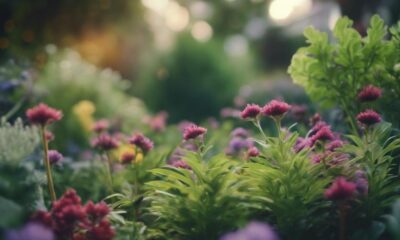
 Anti Aging4 months ago
Anti Aging4 months agoThe Immortal Herb: Unveiling Its Special Qualities
-

 Anti Aging4 months ago
Anti Aging4 months agoWhich Tea Increases Lifespan?
-
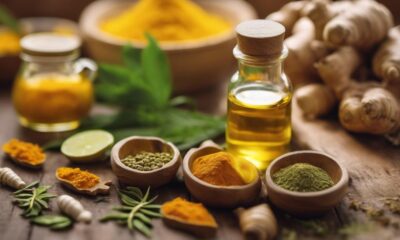
 Inflammation Management4 months ago
Inflammation Management4 months agoBest Natural Medicines for Joint Inflammation Relief
-

 Anti Aging2 months ago
Anti Aging2 months agoAstragalus: The Ultimate Anti-Aging Herb
-
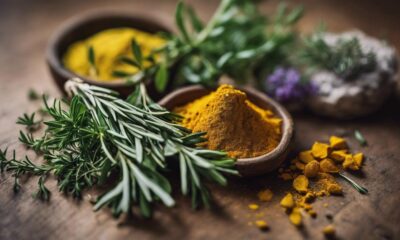
 Mental Health4 months ago
Mental Health4 months agoBest Herbs for Boosting Brain Health


















